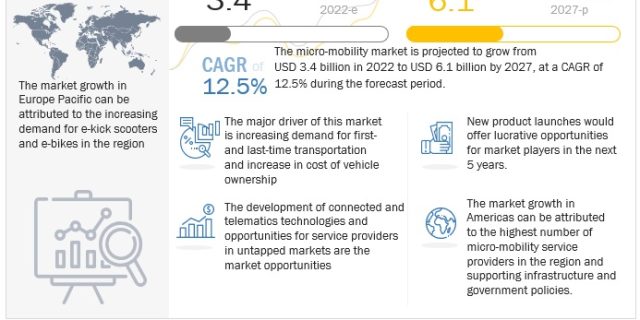
The micro-mobility market is estimated to grow from USD 3.4 billion in 2022 to USD 6.1 billion by 2027 at a CAGR of 12.5% over the forecast period.
Developing connected and telematics technologies, opportunities for service providers in untapped markets, and electric two-wheeler & component manufacturers entering the micro-mobility business would create growth opportunities in the micro-mobility industry.
The human-powered micro-mobility type would hold the largest market share.
The human-powered propulsion segment is currently leading the micro-mobility market globally. The key reason for this growth is the challenges users face with electrically powered micro-mobility vehicles, such as a lack of charging infrastructure and limited battery capacities.
Americas is the leading region for the human-powered (pedal-assist) micro-mobility segment. According to NABSA, of the 128 million trips conducted by micro-mobility vehicles, 47.0 million trips were carried out by pedal assist bicycles in North America in 2021. Additionally, the total number of micro-mobility vehicles deployed in the region was around 232 thousand, amongst which 74 thousand (~32%) were pedal-assist bicycles, which shows that there is high demand for pedal-assist bicycles as compared to e-bikes in North America. The demand for pedal-assist bicycles is increasing owing to health benefits, cost-effectiveness, and easy availability.
Request Free Sample Report @ https://www.marketsandmarkets.com/requestsampleNew.asp?id=71389422
The Asia Pacific would be the largest micro-mobility market during the forecast period
Rising population, improving 4G/5G infrastructure and penetration of smartphones, low cost of micro-mobility services as compared to other ride sharing services like e-hailing or car sharing which can cost $15-$25 per ride and rising venture capital and strategic investments are some of the key reasons why the Asia Pacific would be the fastest growing market for micro-mobility.
The Asia Pacific, with limited penetration of micro-mobility services, currently offers promising growth opportunities for the micro-mobility industry. Countries such as China, Singapore, Japan, and India have invested in smart transportation infrastructure, ensuring a strong position in the Asia-Pacific market. Planned investments to improve urban transport and traffic infrastructure are expected to drive the Asia Pacific micro-mobility market. For instance, in September 2022, Magna invested USD 82 million in Indian based mobility start-up Yulu bikes. The investment further forms the new company named as Yulu Energy which will work on the battery swapping and charging network infrastructure for the other micro-mobility companies. The company is planning to develop more than 500 charging stations up to December 2023. Furthermore, in February 2022, Singapore based mobility startup Beam Mobility raised USD 93 Million to enhance its presence Japan, Indonesia, the Philippines, Vietnam and Turkey. Asia Pacific accounts for a significantly lower number of vehicles per 1,000 persons as the per capita income in most of these countries is lower than in western countries. Hence, micro-mobility offers users a sense of owning a vehicle at a much lower cost than actually owning one. This is driving the demand for micro-mobility in the regions.
Asian countries are having less regulations for micro-mobility vehicles as compared to Americas and Europe. Micro-mobility startups can take the advantages for the quick implementation of micro-mobility infratrucutre across the Asian countries. However, the lack of regulations can results into oversaturated market with millions of bicycles pilling up in the city streets. In July 2022, Futurise organised panel with Beam Mobility, OoGyaa Mobility & TRYKE for the development of micro-mobility in Asian countries by giving opportunity to mobility startups for the partnerships with municipal transport authorities and enhance the network which helps the riders, cities and country.
The increasing number of mega cities and the population growth in developed and developing countries has increased the importance of deploying a smart transportation network. The micro-mobility services in Asia Pacific are growing rapidly because of the demand in countries such as China, India, and Japan. These countries have started recognizing micro-mobility as a solution to curb issues such as traffic congestion, air pollution, and greenhouse gas emissions.
In South Korea growth of electric vehicles is increasing due to increase in infrastructure development for micro-mobility vehicles such as bicycles lanes, docked bicycles stations near the public transport stations and tourist places. SWING, a micro-mobility startup in South Korea operating 35,000 e-vehicles across the country in just two years. The company is further planning to expand into Japan and launching a new business segment in last-mile delivery by offering e-scooters and e-mopeds to delivery riders through its Dayrider service.
China accounts for largest market for mobility business and carry various new technologies in the micro-mobility business. China has embraced the micro-mobility market as a necessary measure to reduce the carbon emissions and traffic. Electric vehicle infrastructure, bicycle lanes, rising number of e-mopeds service providers, growing internet penetration, are some of the factors responsible for driving the market. The availability of charging stations is higher in China than US, which paves the way for increased adoption of e-kick scooter, e-bikes, and e-mopeds sharing services. Furthermore, Chinese government’s plan to reduce the pollution level in major cities such as Xingtai, Hengshui, and Beijing. The government offers several incentives to encourage the adoption of emission free vehicles and micro-mobility sharing services.
Asia Pacific has the presence of many major micro-mobility players such as Niu International, Yulu, Beam Mobility Holdings Pte. Ltd, E-Stralian Pty Ltd, Hello-Bike, Lyft, Moovit, and Lime.
Key Market Players
The micro-mobility market is dominated by a few globally established companies such as Bird Global, Inc. (US), Lyft, Inc. (US), Lime (US), Helbiz Inc. (US), Dott (Netherlands). TIER (Germany), Bolt (Estonia), Voi (Sweden), and Veo (US).
Inquire Before Buying @ https://www.marketsandmarkets.com/Enquiry_Before_BuyingNew.asp?id=71389422
